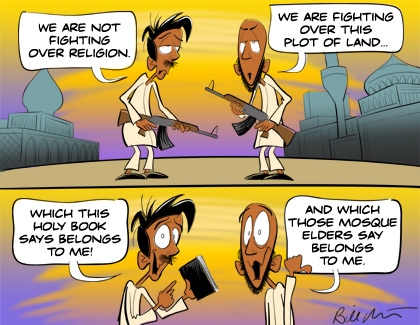Simon Polinder
In 2005 President Mahmoud Ahmadinedad of Iran closed a speech at the United Nations with a call for the ‘mighty Lord’ to ‘hasten the emergence’ of Imam Mahdi, a direct descendent of the Prophet Muhammed. Mahid, a redeemer of Islam, will return from hiding to rid the world of injustice. [1]
According to the Former Palestinian minister of Foreign Affairs Nabil Shaath in an interview with the BBC, Bush said during a Israeli-Palestinian summit that God told him: ‘George go and fight these terrorists in Afghanistan’, ‘George, go and end the tyranny in Iraq’ and ‘Go get the Palestinians their state and get the Israelis their security, and get peace in the Middle East.’ A spokesman for President Bush has said these claims were absurd: ‘He has never made such a comments.’ [2]
Does religion play a role in international politics? Yes, but the question is: did it always play a role and what kind of a role did it play? Did this role change over the years? Is religion really increasing or is it just manifesting itself differently at this moment? These questions are important for people that want to theorize on international relations.

The role of religion in conflicts is nicely illustrated by this comic strip. It shows that religion is seldom the sole cause of a conflict. Religion is often used to raise the masses and unite people for a certain goals. In that case religion catalyzes the conflict. To clarify the role of religion in international relations I study the question: can religion help us to understand or explain international relations? In order to answer this question I start to analyze whether current theories of international relations deal with religion and how the possible absence of religion can be explained. I use this knowledge to evaluate current attempts to give religion a place in theorizing. The purpose of this research is to find out whether the theories that are dominant in the field of International Relations are still valid. If these theories are not valid anymore, I would like to indicate how a theory of international relations and religion should look like. In this way, I hope to serve the world of the second millennium with academic insights.
Contact Simon Polinder
[1] New York Times, 19th of June 2008, consulted at 8-09-2008
[2] Guardian, 7th of October 2005, consulted at 9-09-2008
